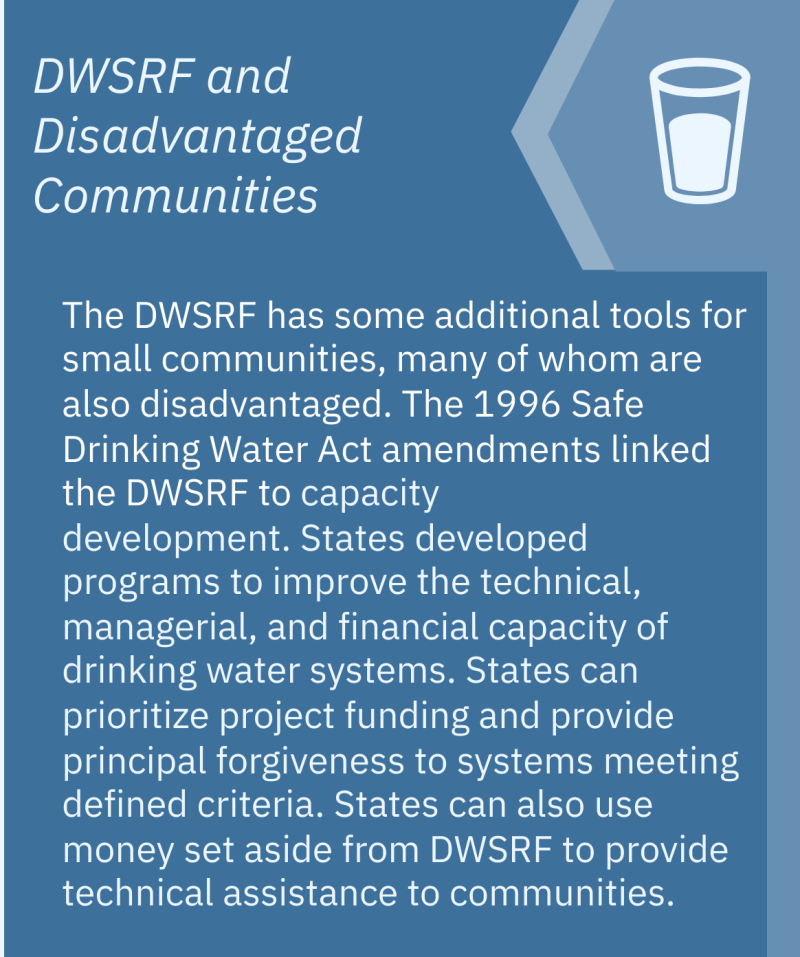Post by Sarah Henshaw, Graduate Research Assistant, and Julia Cavalier, Research Director at the UNC EFC
The EPA’s Clean Water State Revolving Fund (CWSRF) and the Drinking Water State Revolving Fund (DWSRF) programs allow states to provide financial assistance to low-income and disadvantaged communities related to water systems and infrastructure. These programs are partnerships between the EPA and the states. These state revolving fund (SRF) programs provide loans to communities for projects like fixing or replacing old pipes, improving drinking water treatment, controlling nonpoint sources of pollution, or creating green infrastructure projects.
As of November 2021, the Bipartisan Infrastructure Law (BIL) is set to provide $50 billion to the EPA to strengthen the nation’s drinking water and wastewater systems – the largest investment in water that the federal government has ever made. According to the EPA, the majority of these funds will flow through the CWSRF and DWSRF programs. A key priority of the BIL is to ensure that disadvantaged communities benefit equitably from this investment in water infrastructure. In fact, the BIL mandates that 49% of DWSRF and CWSRF General Supplemental Funding must be given as grants and forgivable loans to “disadvantaged communities” or “municipalities that do not meet the state’s affordability criteria.” Along with this requirement, EPA Administrator Michael Regan has encouraged the states to maximize the impact of water funding to address the disproportionate environmental burdens in historically underserved communities across the country. The EPA has announced that it will collaborate with state SRF programs to build state capacity to target resources to disadvantaged communities and will launch a substantial technical assistance program to provide assistance directly to disadvantaged communities. The details of these assistance programs have not yet been announced.
So how are states prioritizing projects? The states develop intended use plans (IUPs) describing how DWSRF and CWSRF funds will be used during a fiscal year. IUPs are extremely detailed and describe which projects are eligible for funding and how states award points to funding applications. The Association of State Drinking Water Administrators has collected disadvantaged community definitions applied to DWSRFs, including whether states provide these definitions in regulation, policy, or IUPs. When EFC staff dug deeper into IUPs for some states in the southeastern United States, we discovered that definitions had not yet been updated to meet all BIL definitions.
The UNC EFC works in its home state of North Carolina frequently, and so UNC EFC staff specifically located and reviewed North Carolina’s draft IUP for FY 22-23. The drafts, which have been published for public comment, show the new text additions in red. The draft describes how the state plans to meet BIL requirements so that disadvantaged communities benefit equitably from this large investment in water infrastructure. The document states that “Projects that benefit disadvantaged areas receive additional priority points.” It defines “disadvantaged areas” based on “either North Carolina Department of Environmental Quality’s (NCDEQ) determination of ‘Potentially Underserved Block Groups’ or Tribal boundaries displayed on the NC DEQ Community Mapping System, or information provided in the application.”
When the UNC EFC can access other states’ draft IUPs, we expect similar changes. We will continue to check on EPA Region 4’s IUP updates for the North Carolina DWSRF and CWSRF and will provide more information when it becomes available.
Need technical assistance? The UNC Environmental Finance Center is here to help!
The Environmental Finance Center at UNC-CH offers free one-on-one technical assistance for small water systems. If you have an interest in our support, fill out our interest form here or contact mullins@sog.unc.edu.
Visit https://efc.sog.unc.edu/technical-assistance/ to read more about technical assistance.



